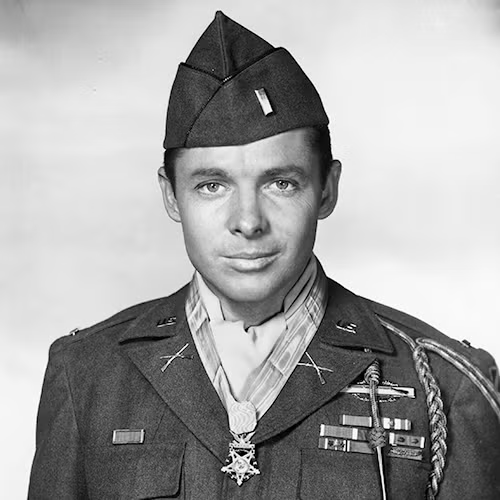
Table of Contents
Who Was Audie Murphy?
Audie Murphy stands as the most decorated U.S. soldier of World War II. By the war’s conclusion, at just 20 years of age, he had demonstrated extraordinary valor, having killed 240 German soldiers, sustained wounds on three occasions, and received 33 awards and medals for his service. Following the war, Murphy transitioned to a successful acting career, appearing in over 40 films. Throughout his life, he faced the challenges of post-traumatic stress disorder, a testament to the enduring impact of his wartime experiences.
Early Life
Born on June 20, 1925, in Kingston, Hunt County, Texas, Murphy grew up in a dilapidated sharecropper’s home. His father, Emit, struggled to fulfill his parental duties, fathering a total of 12 children without a viable plan to support them. As a result, Murphy took on significant responsibilities, often hunting rabbits and other small game to help provide for his mother and siblings.
In 1940, Murphy’s father abandoned the family, and just a year later, his mother passed away. Motivated to honor her memory, he enlisted in the military ten days after his 17th birthday. By February 1943, he had departed for North Africa, where he underwent extensive training.
Military Career of Audie Murphy
A few months after his initial deployment, Murphy’s division participated in the invasion of Sicily, where his exemplary performance earned him a promotion to corporal. While engaged in combat in the challenging wet terrain of Italy, Murphy contracted malaria. Nonetheless, he consistently demonstrated exceptional bravery and effectiveness in battle.
In August 1944, Murphy’s division advanced to southern France as part of Operation Dragoon. During this campaign, his close friend, Lattie Tipton, was tragically killed by a German soldier who feigned surrender. Fueled by grief and anger, Murphy launched an aggressive assault, killing the soldiers responsible and subsequently commandeering their machine gun and grenades. He then attacked additional enemy positions, eliminating all opposing forces. For his extraordinary valor, Murphy was awarded the Distinguished Service Cross.
Throughout World War II, Murphy endured the loss of countless comrades and adversaries alike. His remarkable courage amidst the horrors of war earned him a total of 33 U.S. military medals, including three Purple Hearts and the Medal of Honor.
Upon returning home in June 1945, Murphy was celebrated as a hero, welcomed with parades and lavish banquets. LIFE magazine recognized his heroism by featuring him on the cover of its July 16, 1945 issue, a moment that caught the attention of actor James Cagney, who invited Murphy to pursue an acting career in Hollywood. Despite achieving celebrity status, Murphy faced significant challenges in gaining widespread recognition in the film industry.
Later Years
In 1949, Audie Murphy published his autobiography, To Hell and Back, which quickly became a national bestseller. In 1955, after considerable introspection, he chose to portray himself in the film adaptation of his book. The movie was a significant success, holding the record as Universal Studios’ highest-grossing motion picture until 1975. Over the course of his career, Murphy starred in 44 feature films. In addition to his acting achievements, he also became a successful country music songwriter, with several of his songs recorded by notable artists such as Dean Martin, Jerry Wallace, and Harry Nilsson.
During his ascent to fame, Murphy married 21-year-old actress Wanda Hendrix in 1949. Their marriage was tumultuous, and they announced their divorce plans just a year later. In 1951, he remarried, this time to Pamela Archer, with whom he had two children. Despite his professional success, Murphy struggled with insomnia and recurring nightmares, conditions that would later be recognized as post-traumatic stress disorder. He also faced a severe addiction to sleeping pills.
In his later years, Murphy faced financial difficulties, largely due to gambling and poor investment choices, leaving him in a state of financial ruin by the time of his death. He tragically died in a plane crash on May 28, 1971. Murphy was interred at Arlington National Cemetery on June 7, 1971, receiving full military honors for his service.
